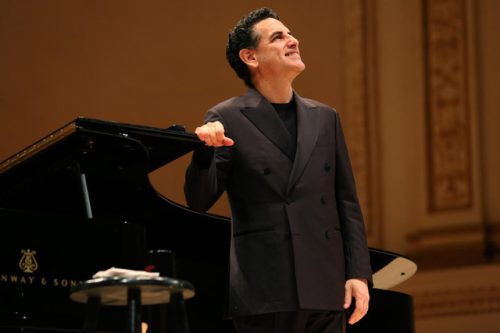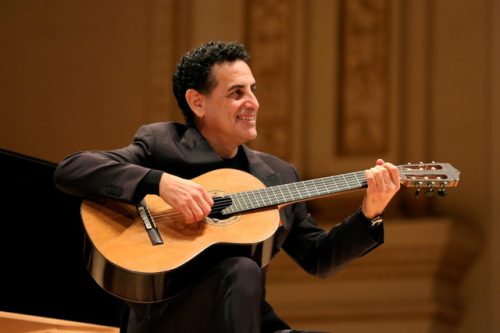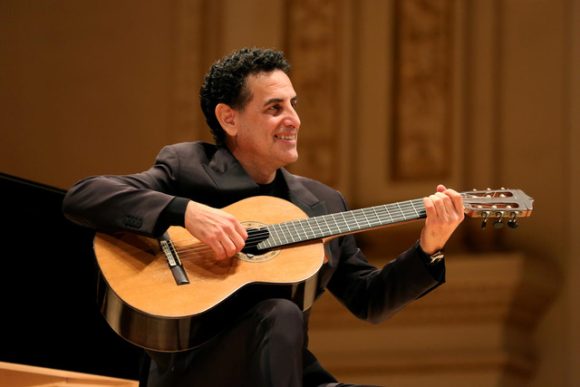 United States Various – Juan Diego Flórez (tenor) and Vincenzo Scalera (piano): Carnegie Hall, New York, 29.11.2023. (RP)
United States Various – Juan Diego Flórez (tenor) and Vincenzo Scalera (piano): Carnegie Hall, New York, 29.11.2023. (RP)

Gluck – ‘O del mio dolce ardor’ (from Paride ed Elena)
Caccini – ‘Amarilli, mia bella’
Carissimi – ‘Vittoria, mio core!’
Rossini – ‘L’esule’, ‘La lontananza’, ‘Danse Sibérienne’ (from Péchés de vieillesse); ‘Deh! tu m’assisti amore’ (from Il signor Bruschino); ‘La speranza più soave’ (from Semiramide)
Donizetti – ‘Linda! Si Ritirò . . . Se tanto in ira agli uomini’ (from Linda di Chamounix)
Salvi – ‘Inosservato penetrava . . . Angelo casto e bel’ (from Il duca d’Alba)
Verdi – ‘Romanza senza parole’; ‘Questa o quella’ (from Rigoletto); ‘L’émir auprès de lui m’appelle . . . Je veux encore entendre’ (from Jérusalem),
Lalo – ‘Puisqu’on ne peut flechir . . . Vainement, ma bien-aimée’ (from Le Roi d’Ys)
Gounod – ‘L’amour, l’amour! . . . Ah! lève-toi, soleil’ (from Roméo et Juliette)
Puccini – ‘Foglio d’album’; ‘Ecco la casa Dio . . . Torna ai felici dì’ (from Le Villi)
The printed program for tenor Juan Diego Flórez’s Carnegie Hall recital was just a tease. It dutifully listed songs and arias from the Italian and French repertoire, all of which are ideally suited to the singer’s voice and temperament. A quick perusal might even have given the impression that the program was a bit light, a mere 90 minutes including an intermission. Especially so as pianist Vincenzo Scalera was to play a handful of solo pieces.
No one, however, left Carnegie Hall feeling shortchanged after Flórez had sung his seventh encore with an audience eager for more. Such generosity was all the more impressive as Flórez was just getting over a cold. The tenor noted the irony in the situation: this recital was originally scheduled for earlier in the year, but he had to cancel due to illness. The lingering effects of his malady explained the small table with tissues and a mug that he turned to frequently during the concert.
Many in the audience remembered the splash the Peruvian tenor made at his Metropolitan Opera debut in The Barber of Seville in 2002. Flórez was 29 at the time and dazzled with his youth, looks, charisma and voice. His physical agility was as impressive as the ease with which he dispatched rapid-fire runs and popped out high notes.
At 50, Flórez’s voice has darkened to a degree, but time has brushed him lightly in all regards. Apart from a few instances of dry, patchy tone, he was in fine shape on this occasion. Whether his tendency to plant his feet firmly on the stage and visibly prepare for climatic high notes was out of necessity – imagine a gymnast preparing to do a difficult vault – or by design is an open question. There is no debating, however, that he nailed each one.
The three early Italian songs that opened the program were at once the most familiar (show me an American singer who doesn’t own Schirmer’s 24 Italian Songs & Arias), and among the most beautiful that the tenor sung. Songs such as Gluck’s ‘O del mio dolce ardor’, Caccini’s ‘Amarilli, mia bella’ and Carissimi’s ‘Vittoria, mio core!’ are generally the preserve of singers beginning their vocal studies. It was a rare treat to hear them done by a singer such as Flórez.
Of all the arias on the program, Flórez was particularly effective in ‘Angelo casto e bel’ from Il duca d’Alba. The original French version of the opera was incomplete at the time of Donizetti’s death. Some thirty years later, his student Matteo Salvi completed the opera in Italian, including this aria. It is a tenor show piece, which Flórez sang with great emotion, abetted by his shimmering pianissimi and ringing fortes.
Of the other arias, ‘Questa o quella’ from Verdi’s Rigoletto was notable for the brightness and fluidity of his voice. The highlight, however, was Roméo’s aria, ‘L’amour, l’amour! . . . Ah! lève-toi, soleil’, from Gounod’s Roméo et Juliette. Flórez summoned all the ardor and impetuousness of youth in expressing the wonder of Juliette’s beauty.
Vincenzo Scalera was Flórez’s exemplary collaborator in mining the subtle delights contained in songs by Rossini and Verdi. The pianist was especially adept at conjuring the sonorities of an entire orchestra in the arias sung by the tenor.
The official program ended with Roberto’s aria, ‘Ecco la casa Dio … Torna ai felici dì’, from Puccini’s Le Villi, and it found the tenor at his most dramatic. Returning to the stage to acknowledge the applause, Flórez was bombarded with shouts for encores and the sight of Peruvian flags waving. Requests for specific songs were hurled from all corners of the hall.

Flórez obliged willingly and treated the audience to seven songs, accompanying himself on the guitar for five of them. He sounded marvelous, and his voice carried effortlessly through the hall as the audience hung on every note he sang. Few singers bring such joy and happiness to a song recital. Small wonder that he is beloved by so many.
Rick Perdian
